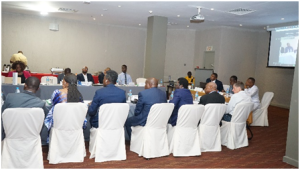By Foday Moriba Conteh
The Center for International Law and Policy in Africa (CILPA), has on Saturday 8th October, 2022 ended a two days Independent Expert Workshop on “Bringing the African Perspective to the IC Reform Discussion.” The Two days Independent Expert Workshop was held at Radisson Blu Mammy Yoko Hotel on Lumley Beach Road in Freetown.
Speaking to this medium, the Founder of Center for International Law and Policy in Africa (CILPA) and Florida International University, Prof. Charles C. Jalloh said that the International Criminal Court (IC) has faced mounting criticism over the past few years as it struggles to fulfill its ambitious mandate as enshrined in the Rome Statute.
He added that poor quality investigations and prosecutions, controversial judicial decisions, institutional infighting and a seeming lack of accountability for poor performance appear to have compounded mounting internal and external problems, including low budgets, limited State cooperation and political backlash from powerful States.
“In response and based on a proposal of the ICC principals in a May 2019 letter, the Bureau of the ICC Assembly of State Parties (ASP) adopted a resolution on 6 December 2019 in which the States Parties recognized the multifaceted challenges currently facing the ICC and established an Independent Expert Review (IER) process,” he maintained.
Prof. Charles C. Jalloh pointed out that the seeming failure to account for the African State views on how to improve the ICC system may constitute a significant missing piece in the ongoing reform discussions. CILPA, with the support of the Open Society Foundations’ Africa Regional Office, has taken this opportunity to launch the African and the International Criminal Court Project to interrogate the relevant issues.
He stated that CILPA has commissioned three independent consultants to conduct research into the experience of African States with the aim of identifying key concerns about the distinct phases of the ICC reform process and propose strategic recommendations to feed into the ongoing IC reform discourse, furthering that the research and analysis carried out by the consultants will form the basis of a comprehensive analysis of the success and limitations encountered by the IC in its ongoing reform process.
The Founder said bringing together the consultants and invited legal experts, predominantly based in Africa, the Workshop serves as a working session with detailed examination of specific themes and provisions identified by the consultants.
He underscored that over the course of the workshop, the experts provided feedback and input to the consultants’ papers and provided an opportunity for participants to express views on how the reforms could be carried out to ensure more transparency and inclusivity of African concerns.
Professor Jalloh revealed that the Workshop thus provided an opportunity for all expert participants to reassess and as necessary help provide ideas for revision and finalization of the draft papers and that these contributions will enable the consultants to make the relevant adjustments to their respective papers before their various reform recommendations are published by CILPA.
Following the statement was a presentation on examining the domestic legal framework in the African States that today form part of the Situational Docket of the ICC, the Role of African States in supporting ICC Investigations, and on the Issue of Corporation and Complementary under the Rome Statute etc.
The workshop also included discussions on the African State Proposals for Improvement to the ICC.





